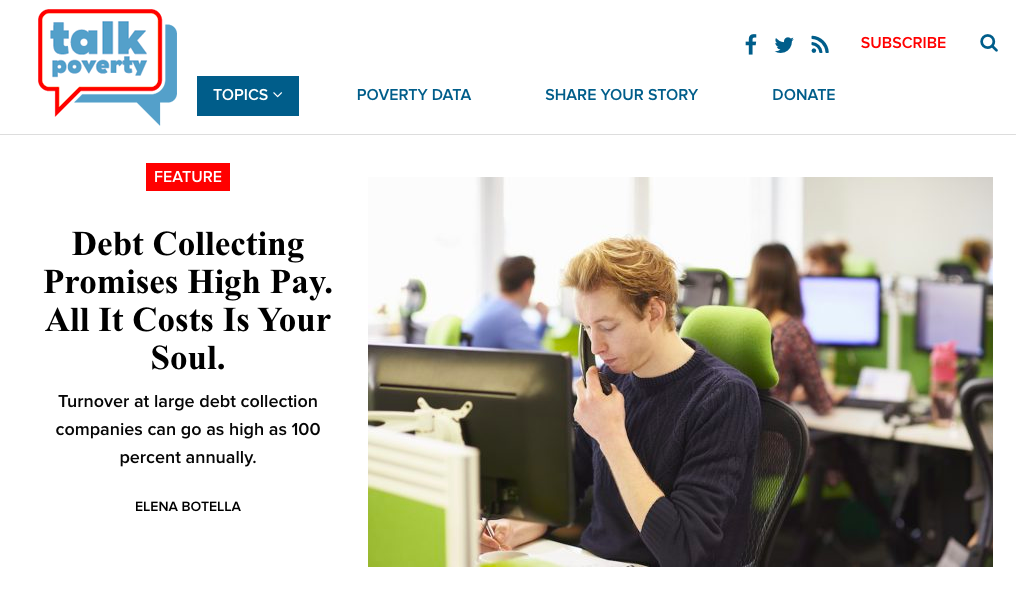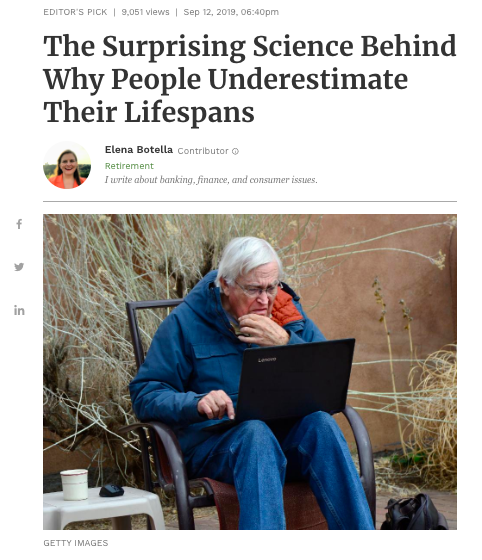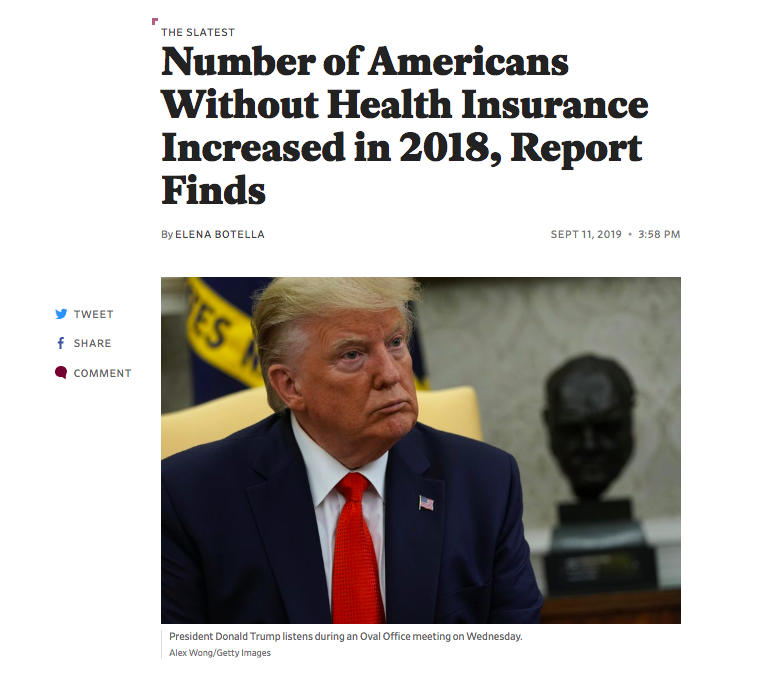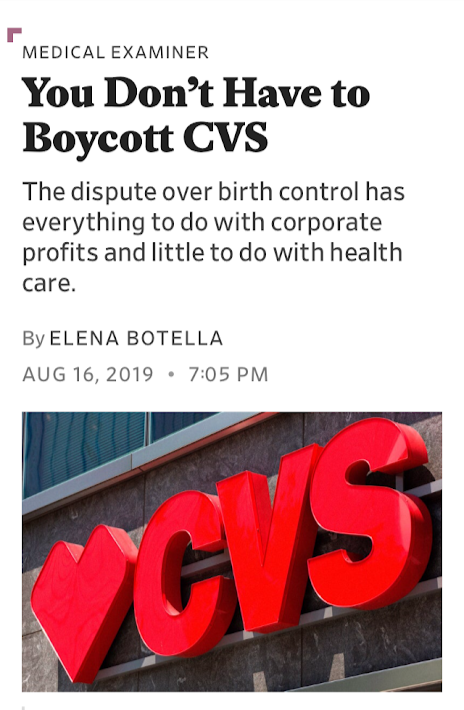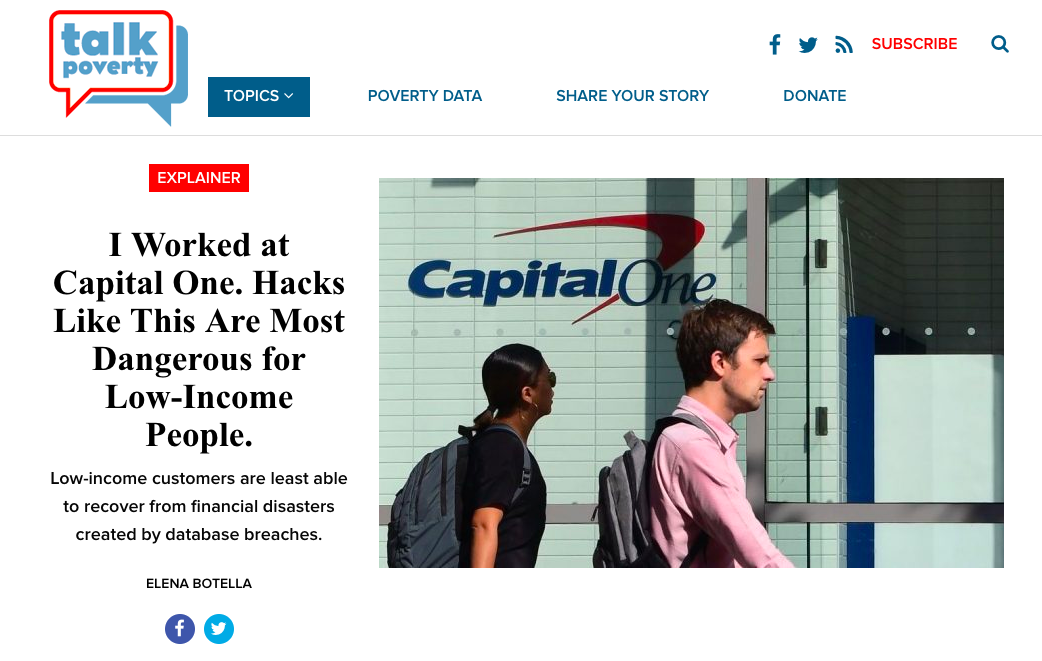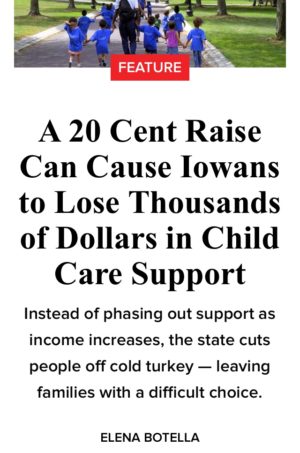For TalkPoverty, a publication of the Center for American Progress, I interviewed subprime debt collectors about their difficult role as intermediaries between Americans in dire financial straights, and the financial institutions posting big profits.
-
-
Why Americans Tend To Underestimate Their Lifespans
United Income estimates households miss on an average of $110,000 from claiming Social Security at the wrong time, usually, from claiming too early. Why are so many Americans claiming Social Security too early? Of course, Americans without much in retirement savings may feel like they have no other choice, but the fact that many Americans underestimate their longevity may be another important cause. A simple mathematical concept called “conditional probability” helps explain why this happens. My article explaining “conditional probability” was named a Forbes.com Editor’s Pick.
-
Number of Americans Without Health Insurance Increased in 2018
For Slate, I wrote about the growing number of Americans going without health insurance. Immigrant children have been particularly hard-hit by this trend.
-
Without systemic change, “corporate social responsibility” will always be window dressing.
On Monday, 181 chief executives of companies like JP Morgan, Apple, and Comcast took out a full-page-ad in the Wall Street Journal to announce that their group, the Business Roundtable, was redefining the “purpose of the corporation.” Their old philosophy said “corporations exist principally to serve their shareholders.” Now, the group says, they’ll do their part to create an “economy that allows each person to succeed” by balancing the interests of shareholders, customers, employees, and the community. This is good news on paper. Obviously, it’s better to have a bunch of high-minded CEOs than for our corporations to be run by people who don’t even pretend to care about their…
-
How the lessons of Tide Pods could clean up the credit card industry
While popular, Tide Pods are staggeringly dangerous for young children and people with disabilities. Proctor and Gamble launched the Tide Pods in 2012. In 2011, 2,862 children were hospitalized because of laundry-detergent related injuries. In 2013, that number was triple: 9,004 children were driven to hospitals by laundry detergent. The problem isn’t that Tide Pods are uniquely toxic, or contain chemicals never used before. The problem is that they’re cute. They’re colorful. And they’re small. It’s the good things about Tide Pods that we have to change to make them safer. What Tide Pods teach us about consumer product safety is that it’s not always the “bad parts” of…
-
You don’t have to boycott CVS over the birth control debacle
Confused about what exactly was happening last week in the #CVSDeniesCare debacle? I broke things down for Slate. Unless you’re a pharmacist, you shouldn’t be upset that “pharmacy benefit managers” like CVS/Caremark try to negotiate down how much they’ll reimburse pharmacies for prescription drugs. There’s absolutely no reason to think CVS/Caremark is targeting birth control specifically, and if PBMs didn’t try to negotiate reimbursement rates with pharmacies, the cost of buying health insurance would skyrocket. Although I didn’t cover the issue of political contributions in my Slate piece, it’s also worth noting that in the 2018 campaign cycle, of CVS, Target, Walmart, Rite-Aid and Walgreens, only CVS donated more to…
-
Two takes on the Capital One data breach
For TalkPoverty, a publication of the Center for American Progress, I wrote about the fact that the Capital One breach put Capital One’s secured card customers at the greatest risk. Secured cards give people who ordinarily wouldn’t be approved for credit a chance to put down a security deposit and get a credit card — but often at a high price, since 3 in 4 secured card customers end up carrying a revolving balance, paying late fees and interest rates of 25%+ to borrow what is effectively their own money. TalkPoverty: I worked at Capital One. Hacks like these are most dangerous for low-income people. On LinkedIn, I express the…
-
18 states later, some reflections
I just finished my road trip. The goal was to learn about the impact that credit cards and payday loans have in Americans’ lives. I’m now back in Washington, D.C. If you haven’t already read the previous blog posts, here were some of my reflections from Michigan and Missouri. Now that I’ve interviewed folks in 18 states for this project (well 17 states, plus the District of Columbia which obviously should be a state!), here are themes on my mind. “Impatience” isn’t the problem In Sacramento, I talked to Kathryn, a 63-year-old woman with $60,000 in credit card debt, which she’s whittled down from a peak of $80,000. Kathryn worked…
-
Inside Maggie Walker’s financial empire
In reviewing Shenette Garrett-Scott’s new book “Banking on Freedom: Black Women in Finance Before the New Deal,” one of the most intriguing pieces for me was exactly how St. Luke’s Bank, America’s first bank founded by black women, was able to use social information to improve their underwriting and uplift their community. When “fintech” talks about using social network information, it normally seems like a workaround for people from wealthy communities to ‘skip to the front of the line’ before they have their own track record of responsible financial behavior. But St. Luke’s Bank was closely tied to a fraternal order, the Independent Order of St. Luke, that brought together…
-
Get a 20 cent raise; lose your child care
We need to do a better job of supporting parents, whether they’re working, in school, or taking care of children full-time. At the federal minimum wage, paying for child care for one child would take the first 26 hours of wages in a 40 hour week (if it’s an infant, the first 32 hours of wages). All 50 states have some amount of federally-funded assistance to help parents afford child care, but in many states these programs have long wait lists, or have extremely limited eligibility. In Iowa, parents lose all assistance at 145% of the federal poverty line (an income of around $25,000 per year for a parent with…
